Diesel Trucks Cause Major Pollution
Diesel trucks are vital for transporting goods across long distances, but they also seriously impact the environment. Consumers have to balance their need for goods with making eco-friendly choices. Diesel emissions can harm human health, damage nature, and drive global warming. That’s why many trucking companies are adopting low-emission diesel trucks, using advanced technologies to reduce harmful pollutants from diesel engines.
New Trucks Slash Diesel Emissions
Low-emission diesel trucks have near-zero levels of particulates and nitrogen oxides, the main causes of smog and acid rain. These cleaner diesel trucks have a variety of new technologies and systems to help alleviate the damage:
- Particulate filters trap tiny soot particles, keeping them out of the air
- Selective catalytic reduction injecting urea to convert nitrogen oxides into harmless nitrogen and water
- Ultra-low sulfur diesel fuel with less sulfur, reducing exhaust pollutants
- Hybrid engines using batteries or fuel cells instead of just diesel, lowering fossil fuel use and emissions
Cleaner Diesel Benefits Health and Environment
The idea of lower-emission diesel trucks is gaining popularity as people realized the number of benefits they can provide.
Human Health
Fewer diesel emissions prevent respiratory illness, asthma, cancer, and cardiovascular disease. The EPA says reducing diesel emissions stops thousands of early deaths and hospitalities annually.
The Environment
Diesel emissions damage crops, trees, soil, water, and wildlife while increasing greenhouse gases. Transportation causes the majority of human-induced global warming, reports the IPCC.
The economy
More efficient trucks save on fuel costs for owners. Low-emission diesel also creates clean energy jobs and markets. The trucking industry is quickly adopting this cleaner technology.
Achieving Near-Zero Emission Trucking
There are several ways manufacturers and the trucking industry are working toward low-emission diesel trucks:
- Replacing older trucks with new models meeting the latest 90% lower EPA and CARB emission standards
- Retrofitting existing trucks with emission controls or cleaner fuels like natural gas or biodiesel to cut emissions
- Adopting fuel-saving techniques like optimal speed, no idling, proper tire pressure, and aerodynamics. The EPA says these can improve fuel economy immensely
- Switching to electric or hybrid trucks running on batteries or fuel cells instead of diesel, reducing or eliminating fossil fuels and emissions. The DOE predicts zero-emission trucks will be cheaper than diesel by 2030
Government Regulations Drive Change
Stricter government regulations are also a key driver pushing the trucking industry toward lower emissions. In the US, the EPA and CARB have implemented new rules requiring diesel trucks to meet near-zero emission standards. The EU has also passed regulations limiting truck emissions. These policies are forcing manufacturers to innovate and trucking companies to upgrade to cleaner vehicles. Regulatory action is critical for reducing pollution from diesel transportation.
The Future is Sustainable Diesel Trucks
Emission diesel trucks use advanced technologies to achieve near-zero emissions, saving money on fuel and reducing environmental harm. The future of trucking seems headed toward sustainable low, emission diesel transportation, which is a win-win for everyone.
This post may contain affiliate links. Meaning a commission is given should you decide to make a purchase through these links, at no cost to you. All products shown are researched and tested to give an accurate review for you.




